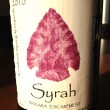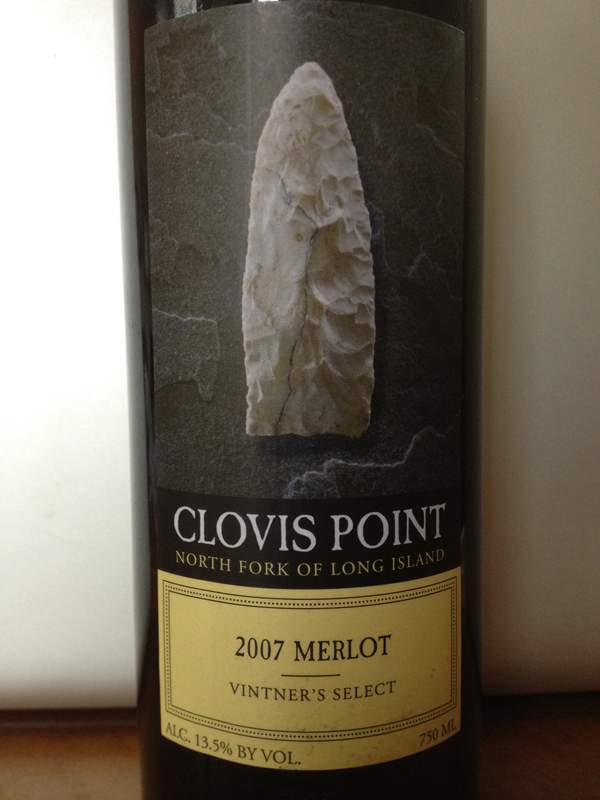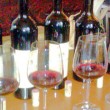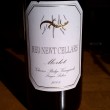What Should We Expect of Wine Writers? Short Visits, Thin Coverage, and Why Specialization Matters
By Evan Dawson, Managing Editor
 If you wanted to gain an understanding of what a winemaker is trying to accomplish, how long would you need? How many wines would you want to taste? How many steps would you need to take in the vineyard? How many questions would you want to ask?
If you wanted to gain an understanding of what a winemaker is trying to accomplish, how long would you need? How many wines would you want to taste? How many steps would you need to take in the vineyard? How many questions would you want to ask?
There is no set standard, obviously. But one of the most valuable exercises we have is the in-person visit to the winery. It helps writers get to know the winemaker, and perhaps the owner and the grower and the staff. It helps us comprehend why certain decisions are made. Interestingly, it's one of the least ideal settings to evaluate wines — we're human, after all, and confirmation bias is ever threatening. But the advantages are many, and direct visits are vital for writers covering a region.
I bring this up because I want NYCR readers to know how we approach our coverage, and I confess to experiencing a bit of shock when I learned how the Wine Advocate's Antonio Galloni was approaching his recent trip to Burgundy.
On the Dr Vino blog, Tyler Colman highlighted a tweet from Galloni in which Galloni said he was visiting nine producers in a single day. Nine visits! I was blown away. Doing the math, Colman figures that Galloni can only spend 30-45 minutes with each producer.
There is simply no amount of training or experience that will allow you to load up a schedule like that and still gain the comprehension that most writers seek. I don't bring the subject up to take a shot at Antonio Galloni, who, by all accounts, is a great guy and an impressive taster. But the Wine Advocate has had a credibility problem in Burgundy for years, and I just can't believe this is the way to improve relations.
To his credit, Galloni responded on Twitter to the questions of Colman and Dan Posner, owner of Grapes The Wine Company. Galloni wouldn't reveal the average amount of time he spent per visit, but he did say that the key was to make sure the producer has the wines set up for tasting in advance, so as to move quickly. He ate a baguette in his car for lunch. When asked if he felt he had sufficient time for each stop, he replied, "Sure thing."
Since his recent promotion, wine enthusiasts have questioned whether Galloni is "spread too thin." He now is responsible for covering all of Italy, Burgundy, Champagne and California. Galloni's schedule in Burgundy offers confirmation that he's being asked to do too much. As a point of comparison, Wine Spectator has, by my count, six people doing the work that Galloni does. It might be more. Italy alone is a behemoth with myriad varieties, and each year the winemaking improves. But with Galloni's workload, he has to focus on the tried-and-true regions, with almost no time to focus on something new and exciting. Just imagine what he could accomplish if he covered only Italy.
Today we learned that Jay Miller is leaving his post at the Wine Advocate after allegations of unethical behavior. (Miller claims the timing of his departure is mere coincidence.) Miller apparently was either incapable of booking winery visits himself, or didn't trust himself to do the work and had help from others who allegedly took advantage of the situation and tried to profit. The coverage duties of Miller, who handled South America, Spain, Washington State and Oregon, will be divided amongst the existing staff. You don't have to ask whether that will make their existing beats more challenging. These are capable professionals, but no one can travel to wine regions on opposite ends of the globe with regularity.
Fortunately for wine lovers, specialized wine writing is beginning to thrive. Note that I did not say blogging, even though this site is still technically described as a blog. True wine writing requires research, experience, and time. Are wine bloggers also wine writers? Some are, absolutely. But now, with the dilution of quality at industry titans such as the Advocate, wine lovers ought to be turning to specialized coverage.
At NYCR, the staff has the opportunity to spend as much time as we need with producers. Last year when I visited with winemaker Derek Wilber, I figured the visit would last roughly an hour. It stretched to two-and-a-half. Wilber is a thoughtful, experienced winemaker who had stories to tell and new ideas to share, and I didn't want to cut it short. There have been visits that I was surprised to find lasted only 40 minutes or so, but that's rare.
That's not to say that Lenn, Bryan, the staff and I are doing things flawlessly. Not even close. We all work full-time jobs outside of our work as wine writers. There are wineries I still haven't visited, and I regret that. But I don't want to sell it short with a drive-by visit, either.
Galloni might say, fairly, that he's not a storyteller; he's a wine reviewer, and he's there to taste wines. But if that's the case, why bother with the visit? He can taste those wines in his office. It's better to spend the time talking, interviewing, and trying to learn what a producer is all about. That time is so valuable, and if you have less than an hour, I can't imagine spending all or most of it tasting a lineup of wines.
But specialized coverage has its own risks for readers. Writers must resist the natural pull to root for a region. We are not cheerleaders. Do we occasionally advocate? Perhaps, but I would say we advocate for open minds and better consumer understanding. If a consumer declares they'll never try Finger Lakes riesling or Long Island merlot or Niagara pinot noir, for example, I'll urge them to reconsider. But I'm not a promoter. I travel and visit and taste wines from around the world to gain an understanding of where the region I cover fits in a global context. Our job is not to convince readers it's something that it clearly is not.
That said, I find specialized coverage to be more professional each passing year. Many companies are attempting to do more with less. But that trend doesn't benefit readers, and eventually, they'll find quality in new sources.













Well said. As we are talking about this year at the EWBC, “become a source” of information. There is a ton of opportunity for bloggers, tweeters, or other “talkers” to create their image as a source of information on one topic, style, idea.
The one thing about a drive-by visit is that it is somewhat representative of what a consumer might experience, so it’s helpful from that perspective. Re-visits can then amend and flesh out that initial experience.
I agree with you and believe there is a growing group of consumers who want to know more about the wines and foods they are consuming. This emerging group will seek more than tasting notes and a number - they want to know the source of the information has a methodology that is allied with their personal beliefs.
Wow. NINE wineries in one day???
Sure, a quick visit shows you something, but to get a real story it takes much more time.
As you know I spent hours with winemakers in the Finger Lakes on a week trip just a few weeks ago. And I could still ask more.
I spent 4 days with a Washington winemaker in October and I still have questions.
I want my writing to share something new with my readers, something that touched me about the wine or winemaker or winery owner, or an idea to try something new and why… not just a quick fleeting taste, but a real story.
My readers deserve that, in my opinion.
Evan:
Where is the evidence of “the dilution of quality at industry titans such as the Advocate,..”? Though you mention questions over whether Galloni is spread to thin or not, where is the evidence the quality of his writing has suffered? Which other WA writers are writing less quality work now?
And which other “industry titans” have diluted quality now?
WA has a set format, which is primarily wine reviews. That has worked for them for many years and they still have a significant readership. It may not be the type of writing some people enjoy to read, but it all depends on the audience. I myself prefer more stories about the wine, but others differ.
Specialization is good for some but not everyone. And certain niches are far more difficult to specialize in than others, especially dependent on one’s location and the extent one wants to cover that niche. For example, a blogger in CA would have a more difficult time covering only NY wines, as it would be much harder to visit NY wineries cause of the distance. And vice versa.
Niches tend to have a smaller readership as they don’t appeal to everyone. How many Americans would read a blog devoted to just the wines of Georgia (country, not state)? There is a need for generalists, who will cover all of the different areas, especially those that get short shrift elsewhere.
Some writers don’t want to be restricted to a certain category of wine. I know I do not. But even specialists seem to want to expand to some degree. NYCR has far more food coverage than it once did. And you have your What We Drank column, allowing reviews of non-NY wines.
As you said, specialization can lead to cheerleading and I am sure we have all seen examples of that. It can happen with generalists as well, but it tends to be more common with specialists as they are closer to their subjects.
I judge each wine writer, magazine or blogger or their own merits, whether a specialist or generalist.
Not everyone enjoys pontification…
Evan,
Thank you for another thoughtful essay. I agree with Richard but Amy seems to have too narrow a view.
The Advocate simply reviews, few “stories” are found on their pages.
Why bother with a short visit when wines can be tasted in the office? I believe Parker’s philosophy is to know something about the owner and winemaker’s methodology and beliefs. My own experience talking and listening to winemakers has been that it takes little time to find this out. In fact, they will readilly expound on their philosophy with no hesitation or delay even if more hours may be necessary to create a story or a column.
My own experience has been that The Adovocate’s reviews are the most reliable with the rest trailing behind in some disorderly fashion. Thankfully, Lenn and his merry crew at the Cork Report is ahead of that pack!
Richard - As occasionally happens on these pages, I post my thoughts, you add yours, and I realize what I missed. I say that with complete sincerity. I think you’ve nailed it. Let me elaborate a bit.
First, regarding dilution of quality: There is no direct way to prove “evidence” of quality dilution. This is an opinion. I find the Advocate to be much diminished, and I think Galloni is excellent in reviewing Italian wines! In fact, I’m not a big fan of tasting notes, but Galloni’s can be among the best out there. His tasting notes often tell the reader more than just a point score; we gain context, sometimes a bit of history, occasionally a look into winemaker intent. That’s precisely why I’m so surprised that Galloni can whirl through visits with such speed. He seems to value tasting note writing more than his peers; much more so than his boss, anyway.
I certainly don’t want to be limited to writing only about NY wine. I’m thrilled to write monthly pieces for Palate Press and a number of other publications. Most of the time, I write about places or producers with whom I’ve visited directly (witness my recent writing about Italy). But not always. It’s not a necessity, but for those who routinely cover a region - a beat, if you will - I do find it vital.
On Twitter, Victor de la Serna posed a great question: If it’s all about the point score, why visit at all? Why not just taste wines in the office, which is a more clinical place to evaluate them (if that’s what you’re going for).
Certain niches are never going to attract huge audiences. NYCR is one, you might say. That’s fine with us; we’re going to do the best work we can, and it will attract an audience organically.
I don’t think you and I are far apart on this matter. I view Galloni with high expectations; I think he’s very good, but being asked to do a whole lot. He writes notes in a way that indicates he is more than a point machine.
Ted - Excellent points, and I see you made the same remark that Victor made on Twitter (as I referenced above). Covering a wine region, even when you’re simply offering clinical reviews and point scores, is a heck of a lot of work. As a reader, I’d like more than that, but certainly readers differ in what they seek.
Hi Evan:
How do you feel the WA quality has diminished? Are the tasting notes not accurate? Has the quality of the review writing gone down? Are Galloni’s non-Italian wine notes of less quality? I understand it is your opinion, which you are certainly entitled to, but I have trouble seeing how WA quality has diminished, especially when it is primarily tasting notes.
And which are other “industry titans” have diluted quality now?
There is some validity to maybe they should simply taste the wines in their offices. But maybe they still want to see the wineries, to have the opportunity to speak to the wine makers if they need to. Even if they have 9 wineries scheduled, maybe they won’t make them all if they choose to stay longer at one spot. It probably would be nice if they could stay longer at each place, but there might be reasons for it that we just don;t know.
As for the niche thing, our views are probably pretty close. I have plenty of respect for the niche wine bloggers out there. But it is not for everyone and there is a need for more generalists as well.
Thanks for your kind words as well.
Richard - At Advocate, the quality plunged with more and more work being handed to Jay Miller. He assumed duties in regions he knew nothing about, and it shows. With Galloni, I’m making an assumption that I think is fair: He is being drawn away from his strength, Italian wines. I find that disappointing. Will he have strength in all of these new regions of coverage? Maybe, but he doesn’t have experience there. And he has all kinds of passion for Italian wines; it’s evident and admirable.
I think Spectator does a stronger job in general, and it’s more to my liking: I appreciate field reports, I like stories about specific vineyards and sense of place, and I dig personal stories. I have less experience with Enthusiast, which seems wobbly.
If I were Galloni, I’d be sensitive to making sure I didn’t insult Burgundian wineries. I’m sure he’s way ahead of me on this score. But I can tell you that I’ve accidentally insulted winemakers by cutting off visits or canceling entirely.
Dear Evan -
Just a few points of clarification your readers might find of interest:
1. Italy - I have covered Italy for the Wine Advocate for 5 years. Each year I have offered our readers coverage of all the major regions, not just the ‘tried and true.’ Are you looking for reviews of wines from Sicily, Sardinia, Campania, Alto Adige, Valle d’Aosta, Veneto, Lombardia, ect? They are there, just take a look. In addition, when I joined the WA I started doing verticals on Italian wines that are now in fashion, but that no one was doing before.
2. Burgundy - I will have spent 6 weeks in Burgundy in 2011. I have visited most of the reference producers more than once this year alone. You can do a day of many visits if you 1) start early, 2) place visits together, 3) ask that wines from barrel to be prepared in advance and 4) use the lunch hour for a tasting.
If I go to Clos des Lambrays (6 wines), Clos de Tart (8 ish wines) or Sylvie Esmonin (10 wines), those are visits I can do in 1 hour, since I have already seen the growers just a few months ago, and one of the vintages I am tasting (in this case 2009) I have already reviewed from barrel, so the in-the-bottle tasting is more about understanding how the wine is showing post-bottling, and to what extent, if any, the wine(s) is/are shutting down. I am disciplined with time, but no more so than a professional athlete is with regards to diet and or workout regime. Today I visited Dujac. It was a big tasting of all the 2009s and 2010s. I allowed 2.5 hours, which was just about right. It is simply a matter of organization.
I work 12, 14 sometimes 16+ hour days. I am motivated by an extreme passion for the world’s great wines, and the people who make those wines. Hopefully that comes through from time to time.
Antonio - Thanks for stopping in and clarifying the process. As I’ve mentioned repeatedly in this thread, I have no doubt about your passion, particularly for Italian wines. Your work in Italy is excellent and appreciated. And your work ethic is impressive, but indicative of a man who has a full plate - and then some!
Do you disagree that, if you did not need to cover California and Burgundy and Champagne, you could spend more time with more producers in Italy? I find Italy fascinating and inspiring. On a recent trip to Italy I was moved by a Gagliopo. So many varieties to discover! I confess I was making an assumption: When you have less time to visit a country’s producers, I assume you will visit more recognized producers in more recognized regions first. I fear the fascinating varieties that go far beyond the usual will have less focus.
Finally, do you find that you can evaluate a wine equally as successfully with the producer as you can in a clinical, office setting?
Cheers, and many thanks.
I should add that another of my favorite specialized reviewers is Advocate’s David Schildknecht. He will have to pick up some of the slack from the departure of Jay Miller, which is too bad. David’s work in Germany is of the highest quality. The addition of Jay Miller five years ago was clearly a mistake, but Robert Parker has also made some excellent additions to his staff in Galloni and Schildknecht. I only hope they can continue to cover the areas that they so highly excel in covering.
Evan-
It is a matter of balancing coverage for our readers, and giving our subscribers the coverage they want most, along with hopefully exposing them to new things along the way.
I don’t see my assignments in California, Champagne and Burgundy as burdens. I spent 3.5 weeks just in Napa Valley this year and loved it. I spent over 2.5 months in Italy this year, including all of July and August, which allowed me to see the period leading up the harvest in numerous regions, where I also filmed video interviews with a number of growers in their vineyards.
Wines will always reveal different facets of their personalities depending on the setting. Tasting with a producer lets you get more context, while a tasting in an office might allow you to do a more comparative tasting across a number of wines.
Antonio - You have a motor that most can’t comprehend, I think! I agree that balance is a great thing to strive for; I don’t seek to malign your work in, say, California. I simply have come to rely on your work in Italy, which seems so natural for you. The wine world is simply huge, and growing, and the demands on you must be intense. While I can’t come around to the notion that your work in Italy is unchanged by the new assignments, I admire your vigor for the endeavor.
Thanks for the post, Evan. There isn’t much that I can add to this discussion — you, Richard and Antonio did a fine job — but I would like to applaud the fact that at least Antonio (and most, if not all, of the writers I respect most) visits the regions that he is responsible for.
I often wonder how some writers can really feel comfortable writing extensively about any region, or even winery, without setting foot there — at least once and better regularly.
I can speak from personal experience that I had tasted many Finger Lakes wines before visiting the region several years ago — but after walking the vineyards and meeting the men and women behind those wines I felt a connection to them and a personal depth with them that simply can’t be achieved remotely. The same is true of my admittedly brief visit to Niagara USA in the spring. I hunger to go back to meet more people, spend time with those that I’ve met already and immerse myself.
Seems like this discussion was linked to by Eric Asimov in the “What We’re Reading” part of the NYTimes’ “Diner’s Journal” blog.